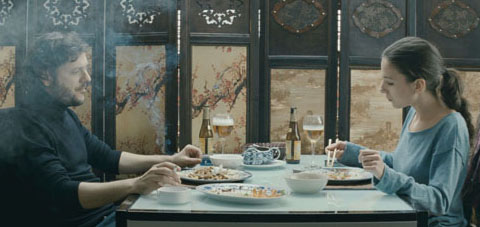“After two drily humorous films about the lingering effects of totalitarian authority on the nation [12:08 East of Bucharest (2006) and Police, Adjective (2009)], [Corneliu] Porumboiu has made another deadpan comedy, but his subject is now himself,” writes Peter Labuza at Reverse Shot. “When Evening Falls on Bucharest or Metabolism would be best described as a self-reflexive investigation into its own aesthetics. Since 2005, Romanian cinema has been largely defined—at least on the evidence of those films receiving festival attention—by long takes, dreary neorealist environments, low-key comic moments, and scenes of seemingly plotless meandering. While looking and sounding like many of these films, When Evening Falls on Bucharest, which follows a filmmaker in crisis, suggests a statement of artistic principles, what he has called in interviews a questioning of his ‘methods of cinema.’ When Evening Falls on Bucharest stages this statement as satire, examining the problematic side to Porumboiu’s own cinematic practices, but in a way that highlights the strengths of this filmmaking style. It’s a paradox that drives this fascinating, peculiar film.”
At Slant, Nick McCarthy finds the film “both oblique and about obliqueness, an indirect but nonetheless insightful observation on the nagging indecisiveness that plagues its Dante-esque antihero, Paul (Bogdan Dumitrache), a chain-smoking, coffee-chugging director who can’t seem to reconcile his life and ideas with the film he’s making. He’s stuck within a purgatorial production process that’s emotionally complicated by an affair he’s having with an actress, Alina (Diana Avramut), who plays a supporting character in his film. Downtrodden by the fact that there’s only two weeks left to shoot, Paul believes he’s also developing gastritis or an ulcer—or perhaps some sort of stress-triggered psychosomatic illness. Burdened by both physical and mental malaise, Paul’s constant equivocation serves as a frizzy line through the film’s static, long-take-heavy compositions.”
Alina’s “role is about to wrap, so he decides to add a dramatic nude scene for her,” notes R. Emmet Sweeney, dispatching to the L from Toronto, where the film screened in the Contemporary World Cinema program. “He soon becomes obsessed with perfecting this short sequence, painstakingly eliminating every ‘unrealistic’ element until it is centered on Alina drying her hair for 10 minutes. Early on, Paul compares the built-in limits of film, having to express a thought in one 11-minute reel, versus the almost unlimited potential of digital. He’s hoping to shrink the borders of his creativity and pare down the decisions he’ll have to make.”
Gary M. Kramer for Film International: “When Evening Falls on Bucharest or Metabolism often features Paul and Alina arguing—about the nude scene, the sophistication of international cuisine, flirtations, and their affair among other things over the course of their relationship—which will end as soon as Alina finishes shooting her scenes. One discussion, in a car, is brilliantly punctuated by one character’s vibrating cell phone. (It is never answered). How Paul and Alina interact is what makes Porumboiu’s film so compelling.”
“The twinned rehearsal and dinner scenes give the film a pleasing structural symmetry,” writes Christopher Bourne at Twitch. “Hesitations, awkwardness, and self-delusions are beautifully conveyed in the dialog. This use of dialog, and the presence of the director character, who indecisively dithers over the direction of his life, brings to mind the films of Hong Sang-soo (who Porumboiu himself cites as an influence) and Eric Rohmer.”
At In Review Online, Carson Lund finds it all “feels a bit too carefully catered to a critical community already attuned to the specific tropes—an emphasis on duration; pale-skinned anti-heroes; unflattering fluorescent lighting; and a desert-dry, even miserablist sense of humor—running through the brief Romanian New Wave lineage, which has the adverse effect of making the film seem closed-in, incapable of delivering more human (read: less cinephile-targeted) pleasures. If this movement has progressed towards cannibalizing itself in this way, where else can it go from here?”
“This could be one of the strangest films ever about the making of a movie,” suggests Howard Feinstein at Filmmaker. “It’s like a meandering 90-minute lecture that leaves you with little more than glazed eyes and a sore backside,” finds Time Out New York‘s Keith Uhlich. At the AV Club, Ben Kenigsberg gives it a C+. And at Criticwire, Graham Winfrey sets it next to Philippe Garrel’s Jealousy. Peter Labuza and Monica Castillo discuss the film in the latest Cinephiliacs podcast. Earlier: Reviews from Locarno. When Evening Falls on Bucharest or Metabolism screens tonight at the New York Film Festival.
And here’s a trailer without subtitles:
Update, 10/28: Patrick Holzapfel interviews Porumboiu for Twitch.
NYFF 2013 Index. For news and tips throughout the day every day, follow @KeyframeDaily on Twitter and/or the RSS feed. Get Keyframe Daily in your inbox by signing in at fandor.com/daily.




